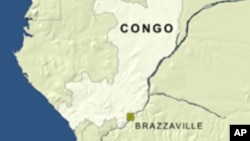A late-night stampede at a military stadium in the Republic of Congo where large crowds of young people waited hours to register at a recruitment event left 31 people dead, authorities said Tuesday.
The Congolese Armed Forces Command announced that all recruitment operations were suspended in the capital, Brazzaville, until further notice following the tragedy late Monday.
Adelard Yvon Bonga, director of Brazzaville's main morgue, told official broadcaster Radio Congo that the death toll stood at 31. The prime minister's office put the figure at 37 earlier in the day, but six of the deaths turned out to have occurred somewhere else, Bonga said.
Brandon Tsetou, a young graduate who escaped the crush that caused some victims to suffocate, said he joined the line in front of Ornado stadium on Monday morning.
"According to the organizers, it was the last day. That's why many of us decided to wait until late into the night, hoping to register," he told The Associated Press. "Some were so impatient that they had to force their way in, causing a stampede that left a number of people dead or injured, which we deplore."
Long lines formed daily outside military recruitment centers over the past week as young people ages 18 to 25 sought to join the army, one of the few institutions offering work in Republic of Congo. As many as 700 people a day registered, though there were only a total of 1,500 spots available.
Among the victims was 23-year-old Chancelvie Oko, according to her uncle Germain Ndzale. Oko wanted to join the military to help her support her two children following her husband's death in a traffic accident two years ago, Ndzale said.
In Republic of Congo, the youth unemployment rate is about 42%, according to World Bank statistics. Despite being an oil-producing country, poverty is widespread in the nation of 5.61 million people, with only 15% of those living in rural areas having access to electricity.
Tresor Nzila, executive director of the nongovernmental organization Action Center for Development, called for a full investigation and for the government to publish a list of victims.
"This human tragedy reflects the distress of a sacrificed youth," he said. "The Congolese government is incapable of creating other employment. The defense and security forces have become the main job providers."
"The government must be held directly responsible, because it did not assess the risks of its actions," Nzila said.
Public prosecutor Oko Ngakala said that an investigation would be launched and questioned why the event was still going on at midnight.




